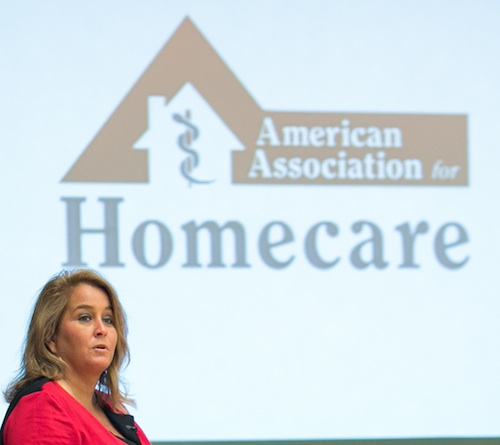WASHINGTON, DC – As noted last week, the recent proposed ESRD & DMEPOS Rule contains positive provisions for many segments of the home medical equipment community but falls short in other areas. We are particularly concerned with the absence of relief for suppliers in non-bid areas that aren’t in specifically designated rural areas, as well as changes to oxygen reimbursement policy aimed at addressing budget neutrality requirements put in place more than a decade ago.
AAHomecare’s Regulatory Council, in cooperation with other stakeholder groups and outside counsel, is currently developing our comments on the Proposed Rule, as well as a summary of our key “asks” for changes to the rule. The Association is looking to develop comments that make a fact-based and highly credible argument for changes to the Rule which will have positive impacts for a broad range of suppliers, as well as patients, Medical professionals, and other caregivers.

“We believe a strong response from HME stakeholder groups and providers who are being negatively impacted by Medicare reimbursement policy is especially important as CMS deliberates on the final shape of the rule,” say AAHomecare officials. “We hope you will consider adding your voice to the comments.”
The most important point to make in your comments is demonstrating how CMS’ policies on competitive bidding, rural/non-bid area rate-setting, and oxygen reimbursement policy are affecting your company and your ability to impact patients. While you can comment at any time, you may wish to wait until we develop and share details on our main “asks” and additional messaging over the next two weeks. You can find information on how to submit your comments here.
Related Resources:
- Full Proposed Ruleand related CMS Fact Sheet
- AAHomecare Rule Summary
- Tips for Submitting Effective Commentsfrom Regulations.gov.
The deadline to submit comments is September 10.
West Virginia Lawmakers Send a Strong Message on Rural Reimbursement Rates
WASHINGTON, DC – This week, West Virginia’s Congressional delegation released a letter to CMS Administrator Seema Verma asking her to address their concerns regarding “the significant cost differences that rural providers face relative to their urban counterparts within the CBAs” after those issues were not resolved in the DME-related Interim Final Rule released in May.
The letter notes a 38% reduction in the number of HME suppliers in the state over the last two years, and also points out that areas CMS designates as “rural” for DME do not mirror the classification for rural clinics and critical access hospitals in the state. The legislators say this disconnect “creates more issues for keeping the cost of providing care across the continuum low due to lack of access,” and also impacts the number of providers serving Medicaid patients in West Virginia.
 Regina Gillispie, president and owner of Best Home Medical played a leadership role in getting the West Virginia lawmakers to weigh in on the issue.
Regina Gillispie, president and owner of Best Home Medical played a leadership role in getting the West Virginia lawmakers to weigh in on the issue.
Gillispie, who has been active on Capitol Hill since the advent of the bidding program, has worked to build strong relationships with healthcare staffers in West Virginia Congressional offices. She has consistently looked for new ways to demonstrate how unsustainable reimbursement rates are impacting suppliers throughout the state. Gillispie also credited Jeanette Lancaster from Mon Home Healthcare and Kevin Milam with The Billing Center for their effective work in engaging their legislators at the most recent Washington Legislative Conference.
To support her arguments that the current rate structure was causing access issues, she connected Congressional offices with state Medicaid officials, who lent additional credibility to industry assertions that patients and hospital discharge planners are being severely impacted by a dwindling provider base. She also raised the issue of the differences in the areas deemed “rural” for HME when compared to the areas used to classify access hospitals that serve as a lifeline for rural communities.
“The information about the differences in rural classification made a strong impression on the Congressional offices,” notes Gillispie. “They know those areas well, and they understand how challenging – and critical – it is to deliver quality care outside of metropolitan areas.”
Thanks and congratulations to the leaders in the West Virginia HME community for their persistent and successful efforts in advocating for HME! See the West Virginia Congressional delegation letter here.
Coordinated Effort to Prevent Competitive Bidding Expansion for Ostomy and Urological Supplies
WASHINGTON, DC – As noted previously, the June MedPAC report included recommendations to expand the Competitive Bidding program to ostomy and urological supplies. AAHomecare shared its concerns with MedPAC, noting the risk for commoditization, adverse health effects, and limited savings potential should these supplies be added to a program already in desperate need of reform.
 AAHomecare prepared a White Paper and issue brief on the issue and is working with other stakeholders for a coordinated educational effort to the Hill and Administration on why MedPAC’s proposal should not be pursued. The Access and Care Coalition, being lead by United Spinal, has retained a lobbying group to assist with these efforts. While the proposed expansion would require a statutory change, the Industry and consumer groups agree that a proactive approach to prevent this from moving forward is paramount.
AAHomecare prepared a White Paper and issue brief on the issue and is working with other stakeholders for a coordinated educational effort to the Hill and Administration on why MedPAC’s proposal should not be pursued. The Access and Care Coalition, being lead by United Spinal, has retained a lobbying group to assist with these efforts. While the proposed expansion would require a statutory change, the Industry and consumer groups agree that a proactive approach to prevent this from moving forward is paramount.
AAHomecare member companies who are interested in learning more about the Access and Care Coalition and contribution opportunities can reach out to Ashley Plauché, AAHomecare’s manager of government affairs, for more information at [email protected].


